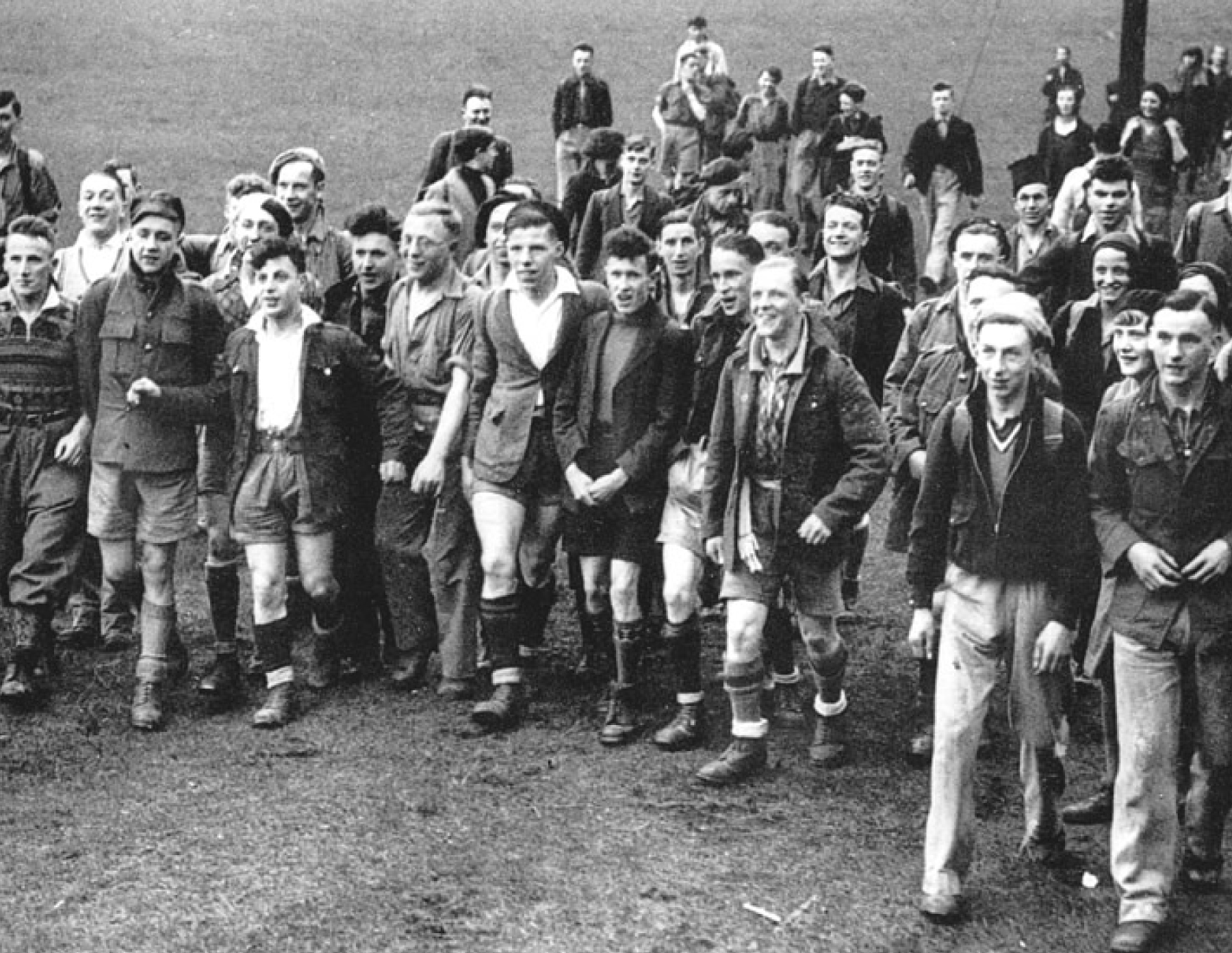Battling for change
1932 – mass trespass won the right to roam
The latest crisis in capitalism has given rise to the ‘Occupy’ movement, a visible and youthful protest at the unequal ownership and distribution of wealth. Eighty years ago working class youth in Britain also held a protest against private ownership, directly challenging the landowning aristocracy over the right of access to open countryside. Roger Bannister writes:
This month, 24 April, is the 80th anniversary of a unique event in working class history, the Mass Trespass on Kinder Scout, Derbyshire, the highest point in the Peak District.
During the 1930s economic depression, working class youth in industrial towns like Manchester, Liverpool, Sheffield or Nottingham, having little money, would take buses or trains out to the surrounding rural uplands of the Peak District, Lake District, Snowdonia or the Ribble Valley, and hike or ‘ramble’ across them, usually in groups.
But from the mid-18th century to the mid-19th century thousands of acres of common land had been “enclosed”, taken over by the aristocracy under laws they put through Parliament, denying the poor their centuries-old rights to cultivate or graze animals there.
In the 1930s walkers were denied access to this land by gamekeepers, and fights between walkers and gamekeepers were not uncommon, with walkers often being arrested. Kinder Scout was owned by the Duke of Devonshire, and kept private for grouse shooting for a couple of weeks each year!
This situation angered many walkers. The Communist Party, which then had a significant base in the working class, including young workers, set up the British Workers’ Sports Federation (BWSF) to campaign for walkers’ rights. Following several fights between walkers and gamekeepers the BWSF, under its Lancashire leader Benny Rothman, organised a ‘mass trespass’ on Kinder Scout on 24 April 1932.
A group of walkers from Manchester was to assemble at Hayfield, and another group from Sheffield at Edale, both picturesque Peak District villages, and walk by different routes to Kinder Scout, where they would meet up. Leaflets publicising the event were distributed, and on the day itself walkers leaving the two village stations were leafleted, and chalked notices on the surrounding roads also urged support.
Police were at the railway station in Manchester, trying to stop Rothman getting to Hayfield, but as he had no money he cycled to the village, giving the police the slip. The “mainstream” Ramblers Association campaigned against the trespass!
Nearly 500 people assembled in a disused quarry near Hayfield, and after brief speeches, set off walking, singing the Red Flag and Internationale, traditional songs of the labour movement. As they reached higher ground they were confronted by keepers, armed with sticks, many of them recruited for the day.
About 40 walkers fought the keepers, usually bare-handed, although some took their belts off to use as weapons. Two keepers were disarmed, and their sticks used against them by walkers. One keeper was knocked unconscious.
Having overcome the keepers the walkers continued on their way, met up with the Sheffield group, and held a victory meeting, the two groups then went back to the two villages. The Manchester contingent formed into a column outside Hayfield and marched back into the village singing triumphantly.
But in the village the police stopped them. Assisted by a keeper, they combed their ranks and arrested five individuals, (another walker had been arrested earlier).The six were charged, pleaded not guilty, and tried at Derby Assizes, by a jury largely composed of landowners and army officers.
One walker had a pamphlet by Lenin on him at his arrest, and that fact was used against him in court! Five were found guilty, one being Rothman, and were sentenced to periods between two and six months imprisonment.
These sentences provoked massive public outrage, and boosted the campaign for walkers’ rights of access to the countryside. Only a few weeks after the Kinder Scout mass trespass an incredible 10,000 walkers, the largest number in history, assembled for an access rally at Winnats Pass, outside Castleton, Derbyshire.
Significantly no more walkers were imprisoned after the Kinder Scout mass trespass. Although World War Two intervened, the post-war Labour government legislated to create National Parks. Significantly the first of these in Britain was the Peak District National Park. Their victories continue – new legislation in 2000 increased what has become known as the “Right to Roam”.









